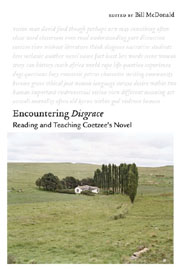Book contents
- Frontmatter
- Contents
- Acknowledgments
- Introduction
- I Reading Disgrace
- II Reading Disgrace with Others
- 11 Community Reading: Teaching Disgrace in an Alternative College Classroom
- 12 Out of the Father's House into a Community of Readers
- 13 Sympathy for the Devil: On the Perversity of Teaching Disgrace
- 14 Teaching Disgrace in the Large Lecture Classroom
- 15 Discussing Disgrace in a Critical Theory Class
- 16 Disgrace in the Classroom: A Tale of Two Teaching Strategies
- 17 The Bodies of Others: A Meditation on the Environs of Reading J. M. Coetzee's Disgrace and Caryl Phillips's The Nature of Blood
- 18 Disgrace as a Teacher
- Works Cited
- Notes on the Contributors
- Index
18 - Disgrace as a Teacher
from II - Reading Disgrace with Others
Published online by Cambridge University Press: 12 September 2012
- Frontmatter
- Contents
- Acknowledgments
- Introduction
- I Reading Disgrace
- II Reading Disgrace with Others
- 11 Community Reading: Teaching Disgrace in an Alternative College Classroom
- 12 Out of the Father's House into a Community of Readers
- 13 Sympathy for the Devil: On the Perversity of Teaching Disgrace
- 14 Teaching Disgrace in the Large Lecture Classroom
- 15 Discussing Disgrace in a Critical Theory Class
- 16 Disgrace in the Classroom: A Tale of Two Teaching Strategies
- 17 The Bodies of Others: A Meditation on the Environs of Reading J. M. Coetzee's Disgrace and Caryl Phillips's The Nature of Blood
- 18 Disgrace as a Teacher
- Works Cited
- Notes on the Contributors
- Index
Summary
In his book, The Genesis of Ethics: How the Tormented Family of Genesis Leads us to Moral Development, Rabbi Burton Visotzky makes a surprising assertion. We do not learn how to live ethically from the rosy, pristine, and immutable portraits of Biblical exemplars perpetually taught in Sunday School. Rather, Visotzky claims, our education begins by reading the Genesis text carefully in community and unearthing the failings of the much-vaunted patriarchs and matriarchs. Only by studying how deeply flawed and fractured are the figures of Genesis, only by grappling with their limitations and mistakes and considering the contrast between the contrived and the described do we discover “the genesis of ethics” (9–13, 15–16).
As a rabbi and teacher, examining texts for moral wisdom in community is a familiar enterprise. But it is not only in canonized texts that one can discern the genesis of ethics. Indeed, readers of Disgrace are familiar with a deeply flawed and unappealing protagonist, a welter of ethical challenge, limitations, and mistakes. Whether as a teacher, a student, a father, a friend, a man, a protector of dogs, or a chaperone of the dead, David Lurie confronts his own unexpected education. For Coetzee's readers, too, Disgrace is a teacher, a text that awakens controversy, troubles complacency, and like Lurie himself, raises questions about how to live a life.
Rabbi Hanina said, “I have learned much from my teachers, and from my colleagues more than from my teachers, but from my students I have learned more than from them all.”
— Babylonian Talmud, Tractate Taanit 7aFor David Lurie, there was a time before disgrace: before disillusionment, before disconnection, before making do in both love and work.
- Type
- Chapter
- Information
- Encountering 'Disgrace'Reading and Teaching Coetzee's Novel, pp. 330 - 340Publisher: Boydell & BrewerPrint publication year: 2009



